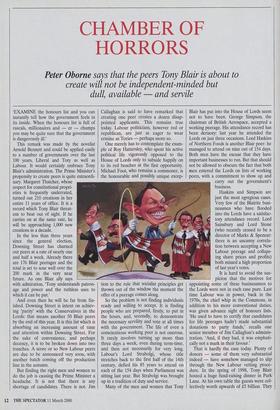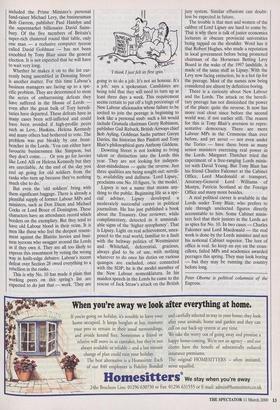CHAMBER OF HORRORS
Peter Oborne says that the peers Tony Blair is about to
create will not be independent-minded but dull, available — and servile
`EXAMINE the honours list and you can instantly tell how the government feels in its inside. When the honours list is full of rascals, millionaires and — er — chumps you may be quite sure that the government is dangerously ill.'
In the less than three years since the general election, Downing Street has churned out peers at a rate of nearly one and half a week. Already there are 176 Blair peerages and the total is set to soar well over the 200 mark in the very near future. As one Blair ally says with admiration, 'Tony understands patron- age and power and the ruthless uses to which it can be put.'
And even then he will be far from fin- ished. Downing Street is intent on achiev- ing 'parity' with the Conservatives in the Lords: that means another 50 Blair peers by the end of this year. It is this list which is absorbing an increasing amount of time and attention within Downing Street. For the sake of convenience, and perhaps decency, it is to be broken down into two tranches. A score or so New Labour peers are due to be announced very soon, with another batch coming off the production line in the autumn.
But finding the right men and women to do the job is causing the Prime Minister a headache. It is not that there is any shortage of candidates. There is not. Jim Callaghan is said to have remarked that creating one peer creates a dozen disap- pointed applicants. This remains true today. Labour politicians, however red or republican, are just as eager to wear ermine as Tories — perhaps more so.
One merely has to contemplate the exam- ple of Roy Hattersley, who spent his active political life vigorously opposed to the House of Lords only to subside happily on to its red benches at the first opportunity. Michael Foot, who remains a commoner, is the honourable and possibly unique excep- tion to the rule that socialist principles get thrown out of the window the moment the offer of a peerage comes along.
So the problem is not finding individuals ready and willing to accept. It is finding people who are prepared, firstly, to put in the hours, and, secondly, to demonstrate the necessary servility and vote at all times with the government. The life of even a conscientious working peer is not onerous. It rarely involves turning up more than three days a week, even during term-time, and then not necessarily for very long. Labour's Lord Strabolgi, whose title stretches back to the first half of the 14th century, defied his 85 years to attend on each of the 154 days when Parliament was sitting last year. But Strabolgi was brought up in a tradition of duty and service.
Many of the men and women that Tony Blair has put into the House of Lords seem not to have been. George Simpson, the chairman of British Aerospace, accepted a working peerage. His attendance record has been derisory: last year he attended the Lords on just three occasions. Lord Haskins of Northern Foods is another Blair peer: he managed to attend on nine out of 154 days. Both men have the excuse that they have important businesses to run. But that should not be allowed to obscure the fact that both men entered the Lords on lists of working peers, with a commitment to show up and carry out the government's business.
Haskins and Simpson are just the most egregious cases. Very few of the Blairite busi- nessmen who have flooded into the Lords have a satisfac- tory attendance record. Lord Sainsbury and Lord Stone (who recently ceased to be a director of Marks & Spencer: there is an uncanny correla- tion between accepting a New Labour peerage and collaps- ing share prices and profits) both missed a high proportion of last year's votes.
It is hard to avoid the sus- picion that the motives for appointing some of these businessmen to the Lords were not in each case pure. Last time Labour was in power, back in the 1970s, the chief whip in the Commons, in addition to his more conventional duties, was given advance sight of honours lists. `He used to have to certify that candidates for life peerages hadn't made substantial donations to party funds,' recalls one senior member of Jim Callaghan's adminis- tration. 'And, if they had, it was emphati- cally not a mark in their favour.'
That, is hardly the case today. Plenty of donors — some of them very substantial indeed — have somehow managed to slip through the New Labour vetting proce- dure. In the spring of 1998, Tony Blair hosted a huge fund-raising dinner in Park Lane. At his own table the guests were col- lectively worth upwards of £5 billion. They included the Prime Minister's personal fund-raiser Michael Levy, the businessman Bob Gavron, publisher Paul Hamlyn and the supermarket billionaire David Sains- bury. Of the five members of Britain's super-rich clustered round that table, only one man — a reclusive computer tycoon called David Goldman — has not been ennobled by Tony Blair since the general election. It is not expected that he will have to wait very long.
Whether he makes it on to the list cur- rently being assembled in Downing Street is another matter. For this time Labour's business managers are facing up to a spe- cific problem. They are determined to stem the series of embarrassing defeats they have suffered in the House of Lords even after the great bulk of Tory heredi- taries have departed. These defeats have in many cases been self-inflicted and could have been avoided if high-profile peers such as Levy, Haskins, Helena Kennedy and many others had bothered to vote. The problem was put bleakly by one front- bencher in the Lords. You can either have favourite businessmen like Simpson, but they don't come... Or you go for luvvies like Lord Alli or Helena Kennedy but they are unreliable. At the end of the day you end up going for old soldiers from the ranks who turn up because they've nothing much else to do.'
But even the 'old soldiers' bring with them significant baggage. There is already a plentiful supply of former Labour MPs and ministers, such as Don Dixon and Michael Cocks or Lord Bruce of Donington. These characters have an attendance record which borders on the exemplary. But they tend to have old Labour blood in their veins. It is men like these who feel the deepest resent- ment against the Blairite luvvies and busi- ness tycoons who swagger around the Lords as if they own it. They are all too likely to express this resentment by voting the wrong way in knife-edge debates: Labour's recent defeat over Section 28 owed everything to a rebellion in the ranks.
This is why No. 10 has made it plain that working peers on this spring's list are expected to do just that — work. 'They are think I just felt its first spin.'
going in to do a job. It's not an honour. It's a job,' says a spokesman. Candidates are being told that they will need to turn up at least three days a week. This requirement seems certain to put off a high percentage of New Labour aficionados whose failure to be invited to join the peerage is beginning to look like a personal snub: such a list would include Granada chairman Gerry Robinson, publisher Gail Rebuck, British Airways chief Bob Ayling, Goldman Sachs partner Gavyn Davies, the historian Ben Pimlott and Tony Blair's philosophical guru Anthony Giddens. Downing Street is not looking to bring talent or distinction into the Lords this year. They are not looking for indepen- dent-mindedness — quite the reverse. Just three qualities are being sought out: servili- ty, availability and dullness. 'Lord Lipsey,' proclaims one No. 10 figure, 'is the model.'
Lipsey is not a name that means any- thing to the public. Beginning life as a spe- cial adviser, Lipsey developed a moderately successful career in political journalism. He has just published a book about the Treasury. One reviewer, while complimentary, detected in it unmistak- able signs of the 'higher sycophancy'. That is Lipsey. Light on real achievement, unex- posed to the real world, familiar to a fault with the beltway politics of Westminster and Whitehall, deferential, gracious, always glad to be of use, with nothing whatever to do once his duties on various quangos are excluded, once connected with the SDP: he is the model member of the New Labour nomenklatura. In his maiden speech in the Lords he came to the rescue of Jack Straw's attack on the British jury system. Similar effusions can doubt- less be expected in future.
The trouble is that men and women of the calibre of Lord Lipsey are hard to come by. That is why there is talk of junior economics lecturers at obscure provincial universities being tapped on the shoulder. Word has it that Robert Hughes, who made a reputation in local government before being promoted chairman of the Horserace Betting Levy Board in the wake of the 1997 landslide, is made of the same stuff as Lipsey. With the Levy now facing extinction, he is a hot tip for the peerage. Most of the names now being considered are almost by definition boring.
There is a curiosity about New Labour and the Lords. The attack on the heredi- tary peerage has not diminished the power of the place: quite the reverse. It now has more real clout since before the second world war, if not earlier still. The reason for this is Tony Blair's aversion to repre- sentative democracy. There are more Labour MPs in the Commons than ever before, and yet never — not even under the Tories — have there been as many senior ministers exercising real power in the Lords. Margaret Thatcher tried the experiment of a free-ranging Lords minis- ter with David Young. But Tony Blair has his friend Charles Falconer at the Cabinet Office, Lord Macdonald at transport, Attorney-General Lord Williams of Mostyn, Patricia Scotland at the Foreign Office and many more besides.
A real political career is available in the Lords under Tony Blair, who prefers to rule through unelected figures directly accountable to him. Some Cabinet minis- ters feel that their juniors in the Lords act as spies for No. 10. In two cases — Charles Falconer and Lord Macdonald — the real work is done by the Lords minister and not his notional Cabinet superior. The lure of office is real. So keep an eye on the coun- cillors, failed MPs and academics awarded peerages this spring. They may look boring — but they may be running the country before long.
Peter °borne is political columnist of the Express.



































































 Previous page
Previous page